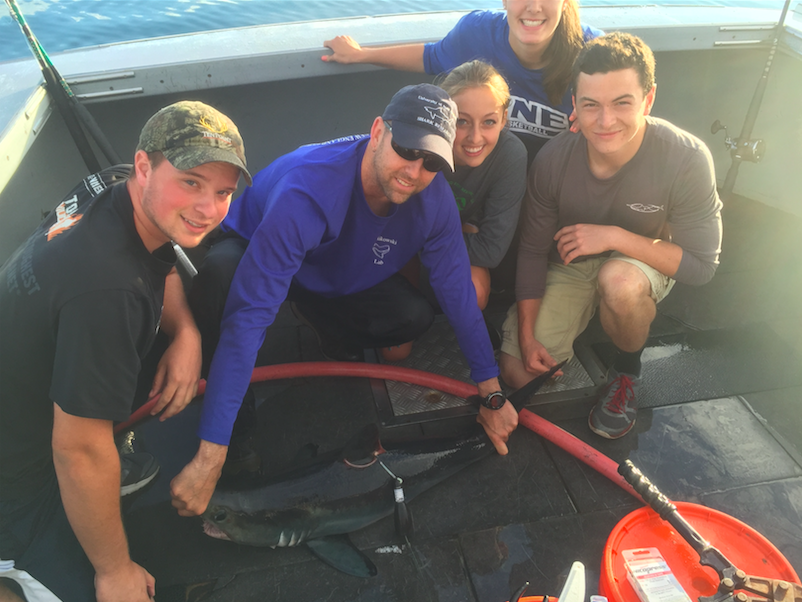Teacher Spotlight: Dr. Shark
October 6, 2016
UNE’s own Dr. James Sulikowski also known as “Dr. Shark,” has been on shows such as Shark Week, Ocean’s Mysteries, Rise of the Invertebrates with David Attenborough, and the Today Show, as well as local media, sharing his passion and research for sharks and marine life. “I have always had an infinity for things in the water; I’ve always loved the water,” Sulikowksi explains when asked why he wanted to study marine biology and more specifically the cartilaginous fish, such as sting rays, skates, and sharks. We sat in his office where multiple jaws of sharks were on display. Getting up close and personal with the skeleton of a shark’s mouth, really hones the thought that sharks are the ocean’s most serious predators. “They have amazing senses; they’re sense of smell is probably the most important when trying to find what they’re looking for. Everything about them; their smell, their vision, hearing, taste, they have electro sensing which allows them to sense heartbeats. They’re pretty intense.”
Sulikowski attended Denison University in Ohio, where he grew up and received his bachelors in Biology. He then received his master’s in Marine Biology and then another masters in Physiology and went on to get his Ph.D. in Zoology. When asked why he continued to pursue higher degrees he answered, “right before I finished my first master’s degree I actually got a job being a high school marine biology teacher, and coached girls basketball and I loved it, but I missed the other components of the research and asking questions and finding answers and that made me want to go back.”
This past summer Sulikowski was featured on Discovery Channel’s Shark Week. “Shark Week was crazy,” he explained, “you are trying to do research and do what you normally do and you’ve got camera crews all over the place.” The research that was conducted on the show was testing human ultrasounds on sharks to see if they were pregnant. “One of my skill sets is reproduction with sharks, so I get to use ultrasounds, take blood samples, so everything that a pregnant, human female would do when going to the doctor, I do that on sharks.” When asked what this information could teach us about sharks he explained that they “link that information with movement patterns and can determine hot spots or areas they may be giving birth in and so linking that information together is really important when looking at sharks.” He also explained how some moments in front of the camera were not real and how he was asked to act in scenes. “What was difficult was when you actually had to act in film scenes and they wanted you to say something in a specific way. We spent a whole extra day on shots that were probably a total of two minutes.”
When asked about his current research he talked about places where he has continually conducted research on sharks. “We do research in the Gulf of Mexico, off the coast of South Florida, we do work in Tiger Beach in the Bahamas, we do work here in the Gulf of Maine, we do work in North Carolina on Sharks, so all over the place.” He has worked in a variety of places, even Canada and definitely keeps himself busy. Future research projects may include expanding work on porbeagle sharks. “That’s a species we have here in the Gulf of Maine and we know very little about them and we would really like to expand that,” he explained. “We want to look into reproduction of porbeagle sharks, along with movement patterns, what they eat, how they interact with the fishing community and that is something we are really excited to expand upon.”
On the negative stigma on sharks, Sulikowski said, “What it comes down to is our fear of the unknown and Jaws didn’t help. You go out into the ocean and you get out past your shoulders and you can’t touch the bottom and you begin to think that there is a shark or something; that’s what everybody thinks.” He further explained, “Jaws really plays into our psyche that something like that will happen, but the fact of the matter is that, it is a chance of one in three-million to be killed and eaten by a shark.” He even explained that one has a greater chance at being bitten by a human on the New York subway. “3,000 people on New York subways will bite other people on New York subways. That’s the statistics, so think about that, you have exponentially more of a chance being bitten by another human being on a New York subway.”
Amongst all the exciting research that Dr. Sulikowski has conducted, he explained another aspect that is the best part of his job, “One of the most important things is getting to work with students, and training them to do the next steps. I think it is really important, because were training our next generation of marine scientists and that’s a really important job. Plus, what I do mixes in with conservation and management of species, so it’s all about letting us be in the water and do things in the water and live off the water and allowing the things that are in the water to be able to live there and have a life, and that’s really exciting to me.”



